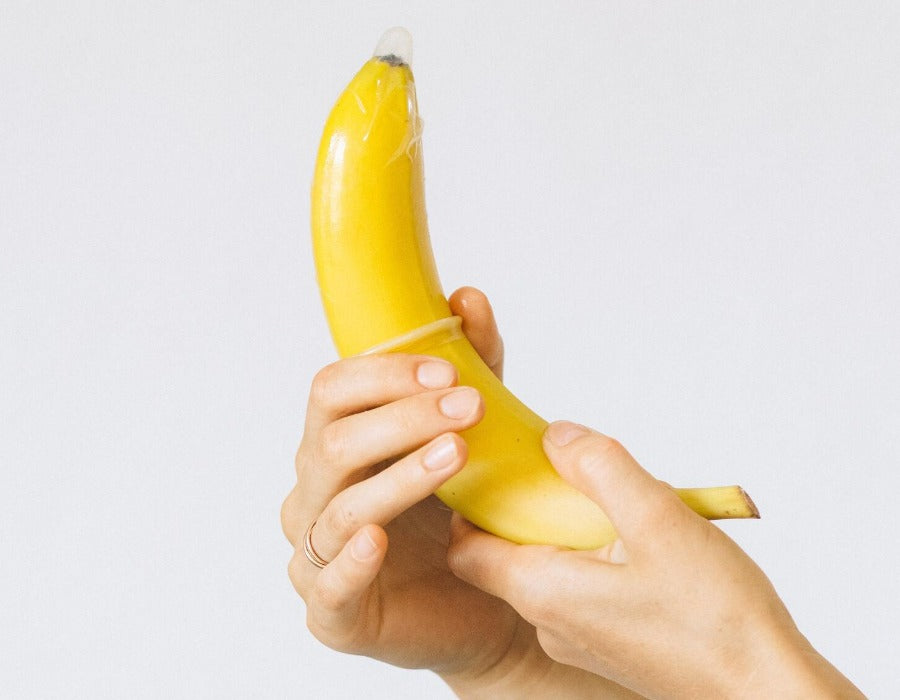For those of you dealing with mental health issues, having to choose between your well-being and your sex life on antidepressants can be a frustrating dilemma.
While antidepressants are proven to have a high success rate in reducing symptoms of depression and anxiety, up to 40% of users report sexual side effects.
Decreased sex drive is often thought to be the number one reason people stop taking their antidepressants. Your well-being plays into sex, and sex plays into your well-being, so it can be a complicated balancing act to maintain the two together.
But what if you didn’t have to decide between happiness and sexual satisfaction? What if you could find a healthy balance? While everyone is different, here are some tips that can help you boost your sex drive while on antidepressants to get the best of both worlds.
How do antidepressants affect your sex drive?
When discussing the sex drive, it's important to understand the physical and psychological responses.
There are four stages in the sexual response cycle:
1. Desire: This is the initial excitement phase which can last from a few minutes to several hours. It’s triggered by mental or physical stimuli and leads up to the arousal stage with increased muscle tension, erect nipples, blood flow to genitals, vaginal lubrication, and pre-ejaculate.
2. Arousal: This is the plateau phase, the acute moment of heightened sexual tension and sensitivity just before orgasm.
3. Orgasm: This is the release of sexual tension resulting in muscle contractions and ejaculation, it generally only lasts a few seconds up to a minute.
4. Resolution: This is the state of recovery and return to normal state. Penises go through a refractory period which can typically last from a few minutes to a few hours. However, continued stimulation of the vagina can lead to multiple orgasms – and in some rare cases, the penis orgasms without ejaculation, or can also experience a shorter refractory period.
As the most commonly prescribed antidepressants, SSRIs (selective serotonin reuptake inhibitors) allow your brain’s nerve cells to retain more of your natural supply of the "happy hormone" - serotonin.
SSRIs mostly affect the initial stage of desire - the physical and psychological motivation to reach the state of arousal. They may also delay or reduce the chance of orgasm.
Some people who take antidepressants report symptoms ranging from a slight numbing of sensation to a loss of feeling entirely in the nipples and genitals. Some develop erectile dysfunction or anorgasmia (delayed, diminished, or inability to reach orgasm).
When serotonin levels go up, it can throw off the balance of other important chemicals in your body - like testosterone and dopamine. This shift can lead to sexual side effects, since testosterone supports desire and dopamine plays a key role in orgasm.
It can take a few months for your body to adjust to antidepressants, and many people's sex drives do return to their previous levels.
Taking SSRIs is not a death sentence for your sex life. The body’s arousal responses and orgasm are still intact - it may just take longer or require more creative measures to get there.
Ways to boost sex drive on antidepressants
If antidepressants have affected your desire or ability to feel pleasure, that doesn’t mean your sex life is over. While there’s no one-size-fits-all fix, there are practical ways to boost arousal, reconnect with your body, and feel satisfied again - without giving up the medication that supports your mental health.
Raise your dopamine levels
Some antidepressants can lower dopamine activity, which plays a key role in pleasure, motivation, and orgasm. To help restore balance, focus on natural ways to support dopamine production.
Start by adding tyrosine-rich foods to your meals, like dark chocolate, almonds, walnuts, bananas, eggs, lean meats, and avocados. Tyrosine is an amino acid your body uses to make dopamine. Certain foods can also help combat erectile dysfunction, too.
Beyond food, other helpful habits known to increase dopamine are exercise, getting natural sunlight, listening to music you enjoy, setting and completing small goals, and practicing meditation.
Exercise
Regular exercise supports both your mental health and your sex drive. It helps increase dopamine, reduce anxiety, and improve body image, all of which play a role in desire and arousal.
Cardio activities like running, swimming, or cycling also improve blood flow to the genitals, which can enhance physical sensation and make it easier to get turned on. Over time, consistent movement can help balance hormones like testosterone and boost overall confidence in your body.
Try a vibrator
When your body isn’t responding the way it used to, vibrators can help trigger responsive desire. Vibratory stimulation has been shown to boost genital blood flow, improve nerve responsiveness, and make it easier to feel aroused - without all the negative side effects of ED meds or other prescriptions.
Crescendo 2, a vibrator clinically proven to increase arousal and lubrication, can be especially helpful in offsetting the effects of SSRIs on desire, and increase your chance of orgasm. Its 6 powerful motors stimulate multiple erogenous zones at once, like the clitoris and G-spot, or the perineum and A-spot, making it easier to build intensity and reach orgasm. Because it bends to fit your body, you’re free to find what works for you instead of settling for a one-size-fits-all solution.
For men dealing with ED because of antidepressants, there's the male vibrator called Tenuto 2. It’s been clinically proven to improve erectile function and performance anxiety with 4 strategic motors that stimulate the entire penis and perineum, for increased blood flow, genital sensation, and genital responsiveness.
We often think desire has to come first, but sometimes arousal leads the way. A little buzz in the right place can go a long way toward waking up both your body and your brain.
Give mindfulness a go
Try mindful techniques, such as deep breathing, to experience more awareness and sensuality in your sex life. Becoming more present in the moment and noticing each and every touch can heighten even the smallest sensation.
Watch or listen to porn
When your natural desire feels muted, erotic content can help reignite mental arousal and stimulate the dopamine system in your brain. Watching porn or listening to porn can provide that extra stimulus needed to reach orgasm. The key is to engage your senses fully: visuals can be exciting, but so can the sounds, rhythm, and emotional tone of a scene.
If traditional porn doesn’t do much for you, try exploring other formats such as ethical porn or audio erotica, which lets your imagination fill in the gaps, which can be especially helpful if you're feeling disconnected from your body.
Explore your fantasies
This is your chance to fantasize and daydream about what turns you on the most. Explore scenarios that spark a physical response, even if they’re a little taboo or outside your usual comfort zone.
Write them down, turn them into erotic fiction, or save them as mental arousal for later. You might even consider sharing your fantasies with a consenting partner, sometimes just saying them out loud can be enough to build arousal. Fantasies are a private playground for desire, and giving yourself permission to explore them can make a big difference in reconnecting with pleasure.
Have patience
Sexual side effects from antidepressants can be frustrating, but they don’t always last forever. For many people, the body gradually adjusts after several weeks or months on a new medication. This "wait and see" period can feel slow, but it is often enough time for your brain’s chemistry to stabilize and for desire and sensation to start returning on their own.
In the meantime, try to let go of goal-oriented thinking during sex or masturbation. The more pressure you put on yourself to perform or reach orgasm, the harder it can be to stay present and enjoy what you are feeling. Give yourself space, time, and compassion, even if it takes a little longer to get there.
Communicate with your partner
Be as honest as you feel comfortable with your partner. Letting your partner know where you're at sexually and explaining any difficulties can relieve pressure, build understanding, and make it easier to relax and enjoy intimacy together. Open communication helps shift the focus away from performance and toward connection, which can make a big difference when you're adjusting to changes in your body or mind.
Go to therapy
Therapy can play a powerful role in supporting both your mental health and your sex life. Talking to a therapist or trying approaches like cognitive behavioral therapy (CBT) can help you work through anxiety, low self-esteem, or blocks around intimacy that medication alone might not address. It also gives you tools and emotional grounding if you ever choose to taper off your antidepressants in the future.
Adjust the dosage (with medical guidance)
Sometimes, a slightly lower dose can reduce sexual side effects without sacrificing mental health benefits. If you're feeling stable on your medication but noticing a drop in sex drive or sensation, talk to your doctor about whether a gradual dosage adjustment could help. Never change your dose without professional advice.
Try scheduling your medication after sex
If you're able to schedule sex in advance, consider taking your antidepressant after sex. Some people find that taking their medication in the evening, rather than in the morning, helps reduce its impact on desire and arousal when they need it most. Always check with your doctor first, as timing changes may not be right for all medications.
Consider switching antidepressants
Not all antidepressants affect sex drive the same way, and everyone’s brain chemistry will respond uniquely to different medications. If your current prescription is affecting your sexual well-being, ask your doctor if a switch might be worth exploring.
Take care of yourself
Your mental and sexual health are deeply connected to how you treat your body. Eating a balanced, nutrient-rich diet, getting enough sleep, and managing stress can all support mood, hormone balance, and desire. Rest also helps replenish dopamine levels, which can make arousal and pleasure feel more accessible over time. These habits won’t replace your medication, but they can help improve your well-being as a whole.
Takeaway
Sexual side effects from antidepressants are common, but they don’t have to mean the end of intimacy. With a little patience and the right support, it's possible to reconnect with your body and bring pleasure back into focus, whether through exercise, mindful porn use, therapy, or clinically proven vibrators that boost arousal and help you reach orgasm.
Having support is also important, especially if you’re in a relationship. Knowing how to help your partner sexually when struggling with mental health can make a meaningful difference in your intimacy and help you navigate the experience together with more understanding.















































